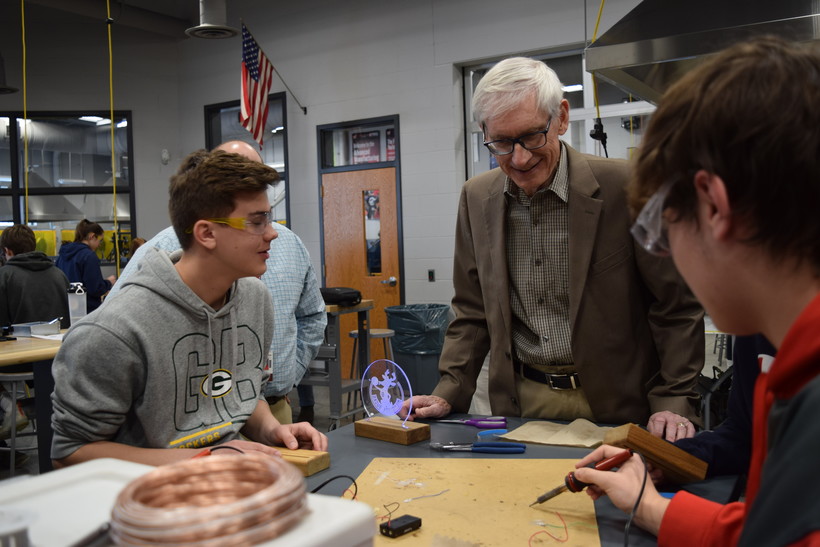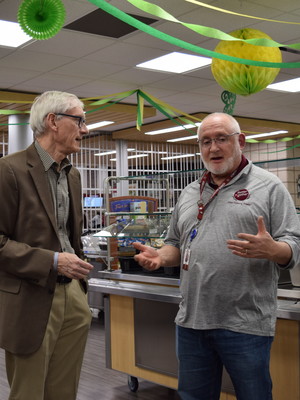Evers Proposes Free School Lunches for All Students
Proposed $120 million program would help students, families and farmers, governor says.

Gov. Tony Evers talks with Caden Monty, left, and Alex Ramussen, both 9th grade students at Holmen High School on Monday, March 13, 2023. Evers visited the school to promote his universal school meal proposal for the next state budget. Hope Kirwan/Wisconsin Public Radio
About one in four students qualify for federally-funded free or reduced school meals in the Holmen School District, where Michael Gasper is the director of nutrition services. In nearby La Crosse, more than half of the district’s students are eligible.
“I think there’s a very distinct working poor class that doesn’t necessarily meet the free-and-reduced level, but they’re struggling, big time,” Gasper said. “You look at what we’re paying for gas, what we’re paying for food, it’s not simply just packing a meal from home and sending it with your kid.”
The 2022-23 school year was the first time in two years that parents and guardians had to apply for free or reduced-price meals based on income. According to the state’s Department of Public Instruction, a student from a family of four with an income of $36,075 per year or less qualifies for free school meals. Students from families of four who earn up to $51,338 can receive reduced-price meals.
During the COVID-19 pandemic, federal funding allowed school districts across the country to offer free meals to all students regardless of income.

Gov. Tony Evers talks to Michael Gasper, director of nutrition services for School District of Holmen, about participation in school meals during a visit to Holmen High School on Monday, March 13, 2022. Hope Kirwan/WPR
Gov. Tony Evers has proposed providing free school breakfast and lunch for all Wisconsin students through a $120 million program in the next state budget. Evers visited Holmen High School on Monday to promote his “Healthy Meals, Health Kids” initiative as Republican leaders in the state Legislature work to prepare their own version of the next biennial budget.
“It sounds like a lot (of money) but we’re talking about hundreds of thousands of students that this impacts across the State of Wisconsin,” Evers said. “For the most part, a lot of the food that goes into food service programs comes from Wisconsin farmers, and we can make that even more important.”
Evers said he hasn’t heard specific pushback on the school meals proposal, so he’s hopeful it will make it through the budget process.
According to Evers’ budget summary, the Wisconsin Food Security Project found food insufficiency among Wisconsin households with kids went from around 5 percent in fall of 2021 to around 13 percent in spring 2022. Evers’ budget proposal also includes $2.75 million to incentivize schools to buy from Wisconsin farmers and local food producers by increasing reimbursement for meals that include locally sourced foods.
Gasper said the free school meals during the pandemic didn’t just help the lowest income students in his district. He said the program increased meal participation rates across his district, especially for breakfast. While only about 25 percent of students currently eat breakfast, Gasper said nearly 60 percent of students were participating when the meal was free for everyone.
“I think that was pretty normal throughout the state, where kids were eating, and it wasn’t just the kids that had to,” he said. “It was a different atmosphere in schools, I think there was a sense of community… And the reality is we proved at that time that we can do universal free meals.”
But Gasper said he “can’t think of anything better to spend our money on” than the students who represent the state’s future.
“People say, ‘Well I paid for my school lunches, why can’t they?’ And I think it’s the wrong way to look at it,” he said. “You didn’t pay for the desk, but your student got to use the desk. You didn’t pay for the books that they read, but they got to use them. Why are we not paying for lunch? Lunch is the one thing that’s really going to set them up right, let’s pay for it.”
Spokespersons for Assembly Speaker Robin Vos, R-Rochester and Senate Majority Leader Devin LeMahieu, R-Oostburg, did not respond to a request for comment on the governor’s proposal Monday. Republicans have raised concerns about the overall cost of Evers’ budget plan and could begin unveiling their own budget in early May.
Listen to the WPR report here.
‘Why are we not paying for lunch?’: Evers, school leaders support plan for free school meals was originally published by Wisconsin Public Radio.






















Why dont parents just grow up and take care of their own children by packing a lunch?
Cause many don’t, Ryan. Or can’t, because they’re working all night/morning. They don’t have the time to whine, hate and pollute websites all day like your needy self does.
All students should be in the same pool when it comes to this. No stimga, no separation. And stop having hunger be a barrier to learning.
Thank you Jake for your response. What so many do not know is that food insecurity is a statewide problem. Some of the biggest food deserts in Wisconsin are in our most rural counties. Why can’t parents just pack lunches? For too many the nearest grocery store may be 30 to 60 miles away.
On the plus side, meals for all children provides opportunities for children to eat healthier; be more engaged with food preparation and production. The more we can teach our children from where our food comes, the more likely they are to try new and healthier foods; foods with less additives (like high fructose corn syrup.) Maybe we could even start addressing the obesity problem in this country or raise the status of our family farmers (who knows, we might just inspire the next generation of farmers.)
Bottom line, free meals for all students has far reaching benefits that will impact all of Wisconsin.